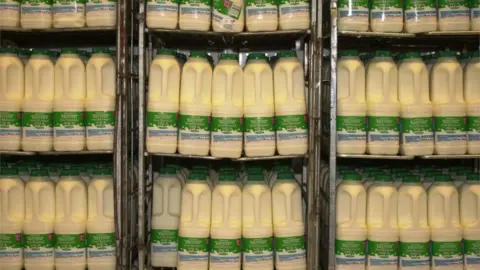Labour accuses government of complacency over cost of living 'crisis'
 Getty Images
Getty ImagesLabour has accused ministers of being "complacent about the cost of living crisis" amid concerns over energy prices and the cut to universal credit.
The party's shadow business secretary Ed Miliband warned that the £20 reduction in benefit payments risked "plunging" people into fuel poverty.
Business Secretary Kwasi Kwarteng insisted supporting energy consumers was the government's "primary focus".
He added that the warm home discount scheme would help vulnerable customers.
From October, around 15 million households in England, Wales and Scotland will face a 12% rise in their energy bills following a squeeze in gas supplies.
So far, six energy companies have left the energy market as a result of recent soaring gas prices, meaning customers could be switched to alternative, and potentially more expensive, providers.
This comes as the government is planning to remove a £20 a week top-up to universal credit, originally introduced help people through the pandemic lockdowns.
Ministers have insisted that the rise was always intended to be a temporary measure - and they want employers to increase wages to cover shortfalls.
Mr Miliband told MPs the government had been "complacent about the crisis in the market, complacent about the impact on families, complacent about the cost of living crisis".
With the £20-a-week cut to universal credit due to kick in shortly, Mr Miliband asked Mr Kwarteng how he could "justify this attack on living standards" with energy prices on the rise.
"The only right, proper and fair thing to do is to cancel the cut," he said.
Mr Kwarteng said there would be "plenty of time" to discuss the cut when the chancellor unveils his Budget in October.

Food price warnings

The Joseph Rowntree Foundation charity has calculated that a combination of rising energy and consumer goods prices, coupled with benefits cuts, would add an extra £710 in annual costs for poorer households.
This includes an extra £3 per week for energy costs and, from April, £2.50 to cover increases in National Insurance contributions - a tax rise introduced to fund the NHS and social care.
Speaking to the BBC's Newscast podcast, the boss of the Iceland supermarket chain Richard Walker also warned of price increases for the company's five millions customers, who he described as coming from "the poorest communities around the UK".
He said the pandemic, HGV driver shortages and other labour shortages would lead to inflation which would translate into food price increases.
"We've seen the price of milk go up from £1 to £1.19 for four pints," he added.

'Winter of discontent'
Mr Kwarteng confirmed that the warm home discount scheme would remain in place.
The scheme - which opens on 18 October - offers eligible people £140 off their electricity bills during the winter months.
A No 10 spokesperson also pointed to existing measures in place to help with energy bills including winter fuel payments and cold weather payments but would not comment on whether they would be increased.
Conservative MPs - including Christopher Chope and Robert Halfon - urged the minister to consider reducing VAT on energy bills to help ease the pressure on consumers.
Mr Kwarteng said he saw the chancellor "on a regular basis" adding that those conversations "tend to be confidential".
The SNP's Patricia Gibson warned of a coming "winter of discontent" and asked why "anyone should have confidence in this government".
In reply, Mr Kwarteng said the government had "done a vaccine rollout that has been the envy of the world, got the economy back up and running and we've navigated the storms of Covid-19 pretty effectively".
